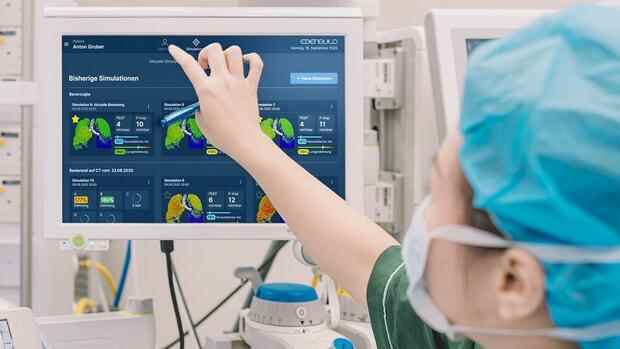Munich Death is a constant companion when patients are artificially ventilated. That was a problem in intensive care units even before Corona. For this reason, Kei Müller has been developing a computer-aided system since 2018 that gives physicians recommendations for the individual treatment of acute shortness of breath.
With the pandemic, it became clear: Müller’s start-up Ebenbuild is in the process of alleviating a problem that is highly relevant to society – and opening up a huge market.
Ebenbuild’s software should then save lives every day. Because “ventilation expertise is relatively rare in hospitals,” says Müller. And even for specialists: “The treatment of people with acute respiratory distress syndrome is difficult.”
Doctors and nurses relied on written formulas, on experience, and often simply on trial and error. In addition, they often lack the time to deal with the large amount of data in detail. “There is an information overload. A person is not able to summarize that in their heads,” says Müller.
Ebenbuild wants to save lives
Ebenbuild should take over this task. Based on the patient data, the software creates a “digital twin” of the lung, an image of the organ on the computer. The software simulates how the tissue stretches during ventilation. Overstretching it can cause lung damage, inflammation, and death. To prevent this, the program calculates how the patient should be ventilated.
According to Ebenbuild, eight million people worldwide suffered from acute respiratory distress syndrome in 2020. Fluid enters the lungs and the condition is life-threatening. Around 60 percent of all Covid 19 patients in intensive care units are affected. The sick have to be artificially ventilated. However, many do not survive the treatment: around three million patients with acute respiratory distress syndrome die every year, two million develop chronic diseases. In the case of corona disease, only about half of those who are ventilated survive.
Since 2018, the founder of Ebenbuild has been working on a technology designed to improve the ventilation of intensive care patients.
(Photo: Ebenbuild)
Aside from the human suffering, mechanical ventilation is also expensive. Longer ventilation times could cost 200,000 euros and more, says health insurance company Debeka. In addition: Corona patients who had to be ventilated during the pandemic spent an average of 31 days in the hospital. They were ventilated for a good twelve days, according to the insurance company in a study published at the end of December. The company determined on the basis of invoices submitted by its customers that these patients were hospitalized for more than twice as long as the average inpatient corona patient.
Chip giant Intel supports level build
Better chances of survival and recovery for patients, lower costs for their treatment: Kei Müller, who holds a degree in mechanical engineering and a doctorate in cell biophysics, is working on relieving the burden on patients and health insurance companies. A first Ebenbuild study with the University of Kiel has already been successful, says the entrepreneur, who now heads a team of eight. With the 2.5 million euros from the investors, Müller now wants to double his team as quickly as possible.
Because he still has too few employees to implement all the plans. With the TU Dresden, Müller would like to test on animals this year whether his system works. In addition, tests with data from several German university hospitals are pending. The pandemic has drawn a lot of attention to Müller’s project: “There is now a much greater awareness of how important ventilation is in intensive care medicine.”
So far, Müller has financed his company with subsidies of over 1.5 million euros. He received money from the public sector and from companies such as the chip group Intel. The Americans support Ebenbuild through their “Covid-19 Response and Readiness” initiative.
However, the semiconductor manufacturer not only provides money – it also works closely with Müller’s people. “The approach is very promising,” says Intel health expert Gerhard Lesch. Ebenbuild have “beacon character”. The company shows how important new technologies can become in healthcare.
The Silicon Valley chip giant provides software to optimize Ebenbuild’s artificial intelligence. Because the calculations require a lot of computer power. It currently takes around ten minutes for doctors to receive the digital advice on their computer. The patient data, such as images from the computer tomograph, are uploaded to a server in a data center via a secure connection. The aim is to inform the doctors in real time soon, says Müller.
In addition, Ebenbuild also uses Intel technology to secure patient information while it is being processed in the data center. “Sensitive data is packed into a protective screen during processing and protected against access,” says Intel manager Lesch. This is important because the data can only leave hospitals if it stays in a trusted environment.
The role model for founder Müller is the company Heartflow from Silicon Valley. The Americans can use computed tomography to visualize arteries three-dimensionally and identify constrictions without catheter examination. Founded in 2010, the company was valued at $2.4 billion last summer. It will be a few more years before Ebenbuild is ready.
Müller firmly believes in the potential of his solution, but does not want to patronize the staff in the clinics either: “We provide recommendations, but ultimately the doctor still decides.”
More: Ambright prints light – and is now looking for sponsors.
